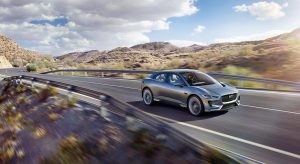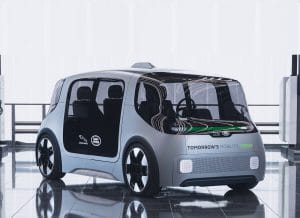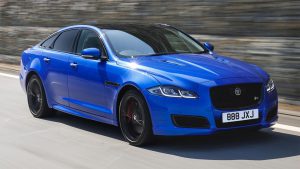
The I-Pace was Jaguar’s first all-electric model. The J-Pace is expected to be bigger – and may also offer hybrid and plug-in powertrain options.
One of the first automakers to launch a long-range battery-electric vehicle, the I-Pace, Jaguar Land Rover has plenty of additional BEVs coming – a new report suggesting a second Jaguar SUV, as well as one from the Land Rover side, are now in the works.
JLR officials have told TheDetroitBureau.com they are committed to electrifying the British marque’s line-up, though Joe Eberhardt, CEO of JLR North America, cautioned in an interview last month that it won’t happen “overnight. It is a progression, a migration.”
But the automaker is already making some hefty investments to bring new BEVs to market while also spending about 1 billion pounds, or $1.15 billion, to retool its big Castle Bromwich plant to handle future battery-electric vehicles. The conversion is expected to permit the factory to produce more conventionally powered vehicles, as well.
(Jaguar Land Rover forges ahead with Project Vector.)
For the moment, the only additional all-electric product JLR has confirmed is the next-generation XJ sedan set to be produced at Castle Bromwich. But there have been numerous reports that more will quickly follow. According to British publication Autocar, two others will quickly follow: the Jaguar J-Pace, as well as a Land Rover offering that appears to go by the internal codename Road Rover.
We could see both products to land in showrooms sometime in the 2021 calendar-year, the publication suggests.
Both J-Pace and Road Rover – whose names may change by the time they’re in production – will share the same platform. The MLA, or Modular Longitudinal Architecture allows for significant flexibility in terms of length, width, height and ground clearance, as well as the number of motors and where they mounted, along with the size of the battery pack tucked under the load floor.
(Jaguar Land Rover Will invest $1.3B to Set Up Battery Car Plant in the UK.)
There is also the possibility Jaguar’s next SUV could be offered with a variety of different drivetrain options, not only including an all-electric package but gas and hybrid versions, as well, according to Autocar.

JLR’s Project Vector is an electric, autonomous concept that could be used for ride-sharing services.
The J-Pace is expected to serve as the brand’s flagship alternative to the next-generation XJ, a logical move considering the ongoing global shift from sedans and coupes to SUVs and CUVs.
If Jaguar does offer hybrids as well as all-electric versions of the two new models it would surprise few. The automaker has had a tough time moving the I-Pace, its first long-range BEV, though analysts blame the SUV’s range issues for at least some of the sales shortfall.
For his part, Eberhardt downplayed the SUV’s low demand rate, telling TheDetroitBureau.com, “I don’t think it’s an I-Pace problem. It’s a question of battery-electric adoption. There’s huge interest in the I-Pace. But when many people go to the showroom they wind up buying (the gasoline-powered) E- and F-Pace models instead. The transition (to buying a battery SUV) takes time.”
(BMW, Jaguar Land Rover team up on next-gen battery-car technology.)
The J-Pace and Road Rover are expected to be relatively conventional in design. But JLR has shown that it may push in an even more radical direction in the future. Last month, it gave us a first good look at Project Vector, concept vehicle that could be used for ride-sharing and other commercial applications. Similar in shape to the Toyota e-Palette and GM’s Cruise Origin concept, Project Vector would be all-electric and autonomous. Prototypes could begin testing on public roads next year, JLR officials have suggested.

